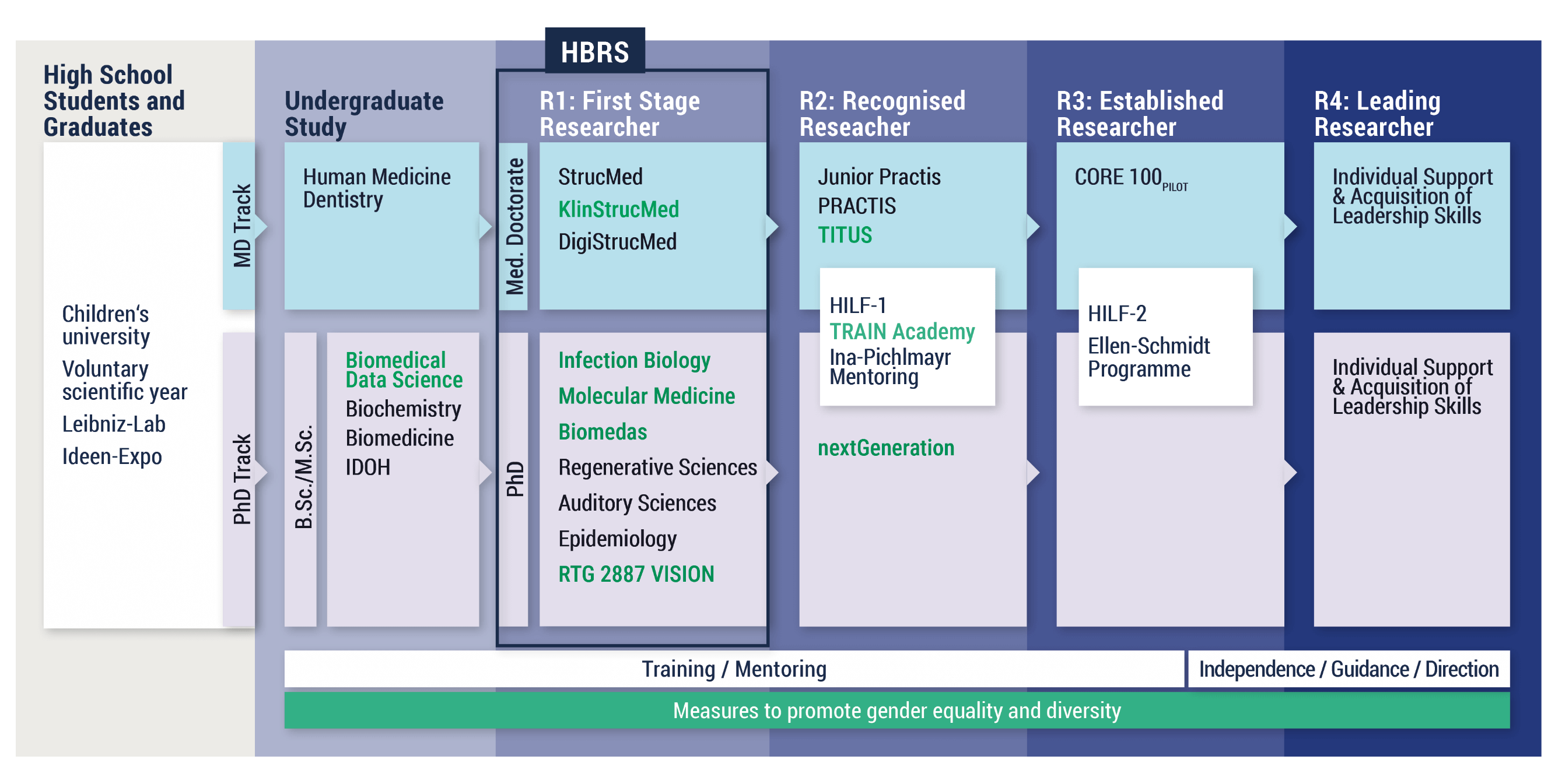Unique Features

HBRS was founded in 2003 as the initial step to realize a continued structured training concept for young scientists at MHH. We call it "career boosting". Meanwhile all career steps have been taken care of and have been included in HBRS as well the MHH Deanery of Academic Career Development. Clinician Scientist programs were added in July 2014.
What makes HBRS unique? The ten most important points:
- Programs and Internationality: Hannover Medical School is the only “medical faculty” in Germany which hosts such a large number of structured doctoral programs under the roof of one graduate school: six PhD programs, Research Training Groups (Graduiertenkollegs), three associated Master programs, and StrucMed / KlinStrucMed / DigiStrucMed, unique programs for undergraduate medical students to perform a Dr.med. thesis. Currently, HBRS students come from more than 40 different countries!
And we're excited to announce that more structured programs (Graduiertenkollegs) are in the pipeline. Stay tuned!!
- Degrees: Hannover Medical School is the only free standing medical university in Germany. And it is among the few “medical faculties/universities” in Germany which are able to award PhD and Dr.rer.nat. (for life scientists only) degrees. Fast-track Master are available in our three associated Master programs.
With us you can professionally and scientifically grow!
- Tradition: HBRS is one of the oldest graduate schools in Germany, with a history dating back to 2003. Our MD/PhD program "Molecular Medicine" was one of the first international PhD program in biomedicine/life sciences in Germany, launched in 2000 and accredited by ZEvA in 2003; the second PhD program “Infection Biology” started also in 2003.
But we do not stand still! HBRS and MHH are continuously setting new standards in Germany for career development in the biomedical field. You can be a part of it!
- Innovation: We have invented the structured doctoral program for medical students (StrucMed) in 2005 as well as the "Voluntary Research Year" for pupils who have just finished their high school. Both are meanwhile taken as German-wide models. KlinStrucMed was launched in 2015, initially supported by the Else-Kröner Fresenius Foundation and now primarily funded by other foundations. This is the first structured program in Germany, in which undergraduate medical students perform a doctoral thesis (Dr.med.) in the field of clinical studies combined with a sophisticated training program.
We're committed to expanding our training in digitalization. The PhD program BIOMEDAS started in October 2020, a Master program in 2021, as well as from July 2021 medical students can participate in DigiStrucMed (supported by the Else-Kröner Fresenius Foundation). Get in touch with us to learn more!
- Experience: HBRS is widely regarded as a model for many graduate schools, and we were the most developed graduate school supported by the German Excellence Initiative (BMBF) in 2006. We have long-standing experience in organizing structured doctoral programs!
We're committed to staying at the forefront of doctoral and postdoctoral training, setting new standards in Germany for supervision, PhD thesis evaluation, and programs like Medical and Clinician Scientist Programs. You are encoraged to discuss with us and to share your ideas!
- Support: HBRS provides a comprehensive support package, including orientation weeks, social events, counseling, housing, and financial assistance for travel, stipends, and short-term stays abroad. We also offer additional support for families, including childcare and babysitting services.
We're a student- and family-friendly community! Feel free to reach out to us with any questions or concerns.
- Selection: We were the first PhD programs in Germany to conduct personal interviews on site in India (China), in strong cooperation with the DAAD and DFG.
We annually accept new students. Please give it a try and join our Hannover Biomedical Research School even if selection is tough.
- Partners: HBRS is not only the umbrella of structured doctoral programs at Hannover Medical School, but interacts with a number of partner institutes: the Leibniz University of Hannover, the University of Veterinary Medicine Hannover, the Helmholtz Institute for Infection Research Braunschweig, the TwinCore in Hannover, the Fraunhofer Institute for Toxicology and Experimental Medicine Hannover, the NIFE Hannover, the Friedrich Löffler Institute in Mariensee etc. HBRS also fosters cooperations with industry partners.
Enjoy the spirit of networking in a creative environment with well-equipped infrastructure!
- Integration: All programs in HBRS are interlinked and integrated into the four research foci “Infection and Immunology”, “Transplantation/ Tissue Engineering/ Stem Cell Biology”, "Biomedical Engineering and Implants" and "Oncology" of Hannover Medical School, and collaborative research centres like Excellence Clusters Hearing4all and RESIST, German Research Centers DZIF and DZL, SFBs (DFG), BMBF Centres or Networks of Competence, Clinical Research Groups (DFG).
We have applied for a couple of new grants, including the German Excellence Initiative. We will update you!
- Perspectives and Alumni: So far, the overall impact factors of all finalists were about an average cumulated value of 10 impact factor points for each student (mostly first-author papers)! Career perspectives are excellent.
We have already established a huge Alumni network, stay in touch with people and publish an annual HBRS Alumni newsletter.
HBRS community will for sure support you to set up your career goals!
